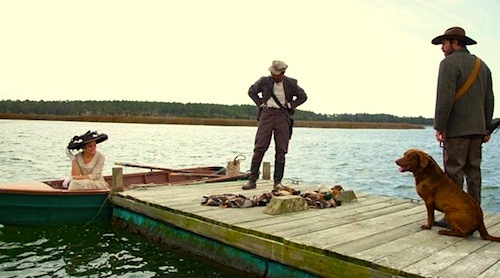By Joe Bendel. Ward Allen was like a grown-up version of Huck Finn. The heir to one of Savannah’s largest plantations, Allen willingly renounced a life of privilege for a wild and woolly existence supplying fresh game to the city’s markets. Unfortunately, the march of progress will not heed the angry editorials penned by the “Buffalo Bill of the River” in Annette Haywood-Carter’s Savannah, which opens this Friday in New York.
The Oxford educated Allen had a talent for blasting ducks out of the sky. Christmas Moultrie was a close second. Savannah’s last child born into bondage, Moultrie had a long history with Allen’s family that evolved into a close camaraderie with Ward. While this rather puzzles some of Allen’s would-be peers, his open defiance of modern game regulations often leads to more pressing problems with the law. Despite his roguish carousing, Allen catches the eye of Lucy Stubbs, the headstrong daughter of Savannah’s least amused old money family.
Sadly, Allen was not cut out for the modern world, as viewers can easily deduce from the flashback structure. Still, he left behind some colorful stories that Moultrie never tires of retelling in his twilight years. In fact, those anecdotes formed the basis of John “Jack” Eugene Cay Jr.’s Ward Allen: Savannah River Market Hunter, the historical monograph on which Savannah is partly based. Initially the Cay Family’s guide on river excursions, Moultrie forged a close relationship with the Cays that led to Savannah the film, co-produced and financed by Cay’s son, John.
Considering both Cays appear as characters in the wrap-around segments, it will be tempting for critics to dismiss Savannah as a vanity adaptation of a vanity publication, but there is more to it than that. Frankly, it is an intriguing example of how tall tales and legends are passed down and codified in the digital age. The relationship between Moultrie and both Allen and the Cays is also quite touching. The near total lack of racial tension, aside from a flashback to Moultrie’s childhood, is obviously difficult to buy, but Savannah’s apolitical stance is frankly rather refreshing.

It is also easy to understand why Haywood-Carter was attracted to Allen as a historical and dramatic character. Temperamentally too much of an anarchist to be considered a Southern Agrarian, Allen’s advocacy of a more natural, less mechanized lifestyle may well resonate with contemporary audiences (who do their hunting and gathering at Whole Foods).
Jim Caviezel is surprisingly charismatic as the reckless, larger than life Allen. A bit of a departure for the Person of Interest star, he clearly seems to enjoy Allen’s boozing and bombastic Shakespeare quoting. Hal Holbrooke also appears to be having a ball as Judge Harden, the acerbic jurist who passed the bar and was appointed to the bench only to spend most of his career trying Allen for hunting season violations.
Evidently the circumstances surrounding Allen’s marriage are the best sourced elements of the film, but they are also the dullest. Nevertheless, Jaimie Alexander plays her with some welcome attitude and backbone. However, Chiwetel Ejiofor’s Moultrie mostly just stands about, looking vaguely pained by Allen’s self-destructive behavior. On the other hand, he contributes the eerie blues rendition of “Wade in the Water” heard over the final credits.
The American South is often shortchanged by Hollywood films that too often reduce the culturally fertile region to a burning cross. The reality was much more complicated than that. At least Haywood-Carter and her co-screenwriter Kenneth F. Carter take a stab at a more balanced portrayal, but the results are certainly mixed. Mainly recommended for those looking for the PBS Masterpiece Classic version of History Channel’s swamp people reality programming, Savannah opens this Friday (8/23) in New York at the AMC Empire, as well as theaters throughout the southeast.
LFM GRADE: C+
Posted on August 21st, 2013 at 2:32pm.